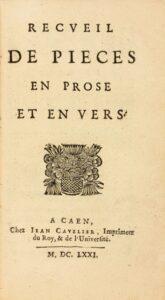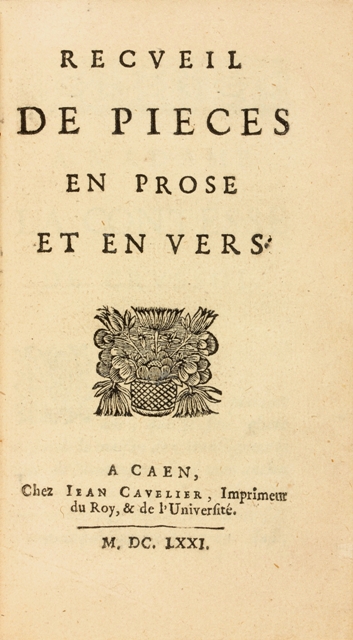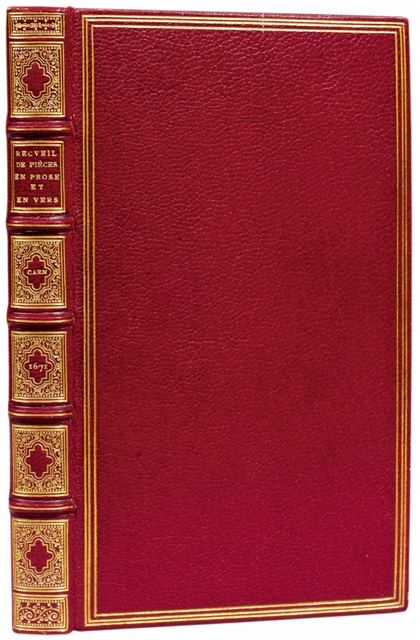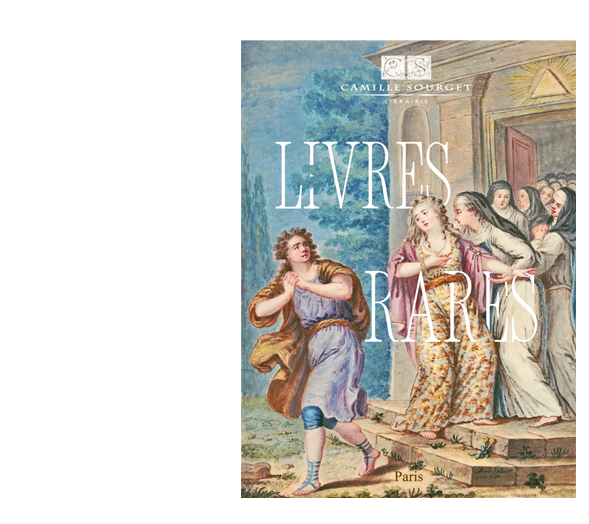Caen, Jean Cavelier, 1671.
12mo [140 x 80 mm] of (1) bl. l., (6) ll., 179 pp., (1), (1) bl. l. Bound in red full morocco, gilt triple fillet on borders, inner gilt border, gilt over marbled edges. Lortic Fils.
Rare first edition of this collection of plays by the Norman scholar Moisant de Brieux, considered as one of the greatest poets of his time.
Catalogue Ruble, 559; Bulletin Morgand et Fatout, 6983; Brunet, III, 1791; Frère, Manuel du bibliographe normand, 155.
“Rare first edition of this collection of prose and lines, gathering among others a piece entitled: ‘Cy est ly traitie de Chevalerie à tous allans et venans, translaté du latin en langue vulgaire’ (en l’année 1377).” (Ruble)
“Poems by Moisant de Brieux are composed of stanza, odes, enigmas, epigrams and madrigals. Plays in prose, which are pp. 103-172, have more interest than plays in lines. Almost all of them are dedicated to the study of our old language that the Norman poet cultivated with predilection. We find in particular the text of a ‘Traité de Chevalerie, à tous allans et venans’, which was translated into French in the year 1377. The volume ends with a ‘Tombeau de mademoiselle de La Luzerne et de monsieur de Ruqueville, son frère’. Mlle de La Luzerne was the ordinary correspondent of Moisant de Brieux, to who was addressed his philological researches.” (Catalogue Rothschild, n°1907)
“Raised in the Protestant religion, Jacques Moisant de Brieux (born in 1614 in Caen, died in 1674 in the same town) was a student at the University of Sedan, in which every master professed Protestantism. After being councillor for a while at the Parliament of Metz, de Brieux came back to Caen where was blossoming a multitude of scholars; with them being his model, he dedicated himself to the letters. He gathered all the scholars of Caen in his home: Huet, Bochart, Tannegui Lefèvre, Heinsius, Chapelain, La Roque, Ségrais, etc. Those meetings held on Mondays every week and during which they would talk of points of history and literature, gave birth to the Académie de Caen. M. de Brieux was corresponding with a part of the scholars from Europe.” (Frère, Manuel du bibliographe normand, 154).
Ennobled by Louis XIV in 1644, Moisant receives his title in 1665 and confirms his nobility “for the respect and the reputation he acquired among the Scholars and People of Letters”. More than any other, he revived the liking for letters thanks to the foundation of the Académie des Belles Lettres of Caen (1652) which perpetuated under this title. Moisant de Brieux was known for being one of the best Latin poets of his time, Bayle who judged Moisant de Brieux “the greatest poet in France and highly into the Belles Lettres”, speaks of his lines with the greatest praises…
“All Moisant de Brieux’s works are rare and sought-after” adds Frère in his Manuel du bibliographe normand.
A fine copy of this rare literary work finely bound in red morocco by Lortic fils.
According to our researches, only 3 French public Institutions would own this first edition: the Libraries of Caen and Rouen, and the B.n.F.



